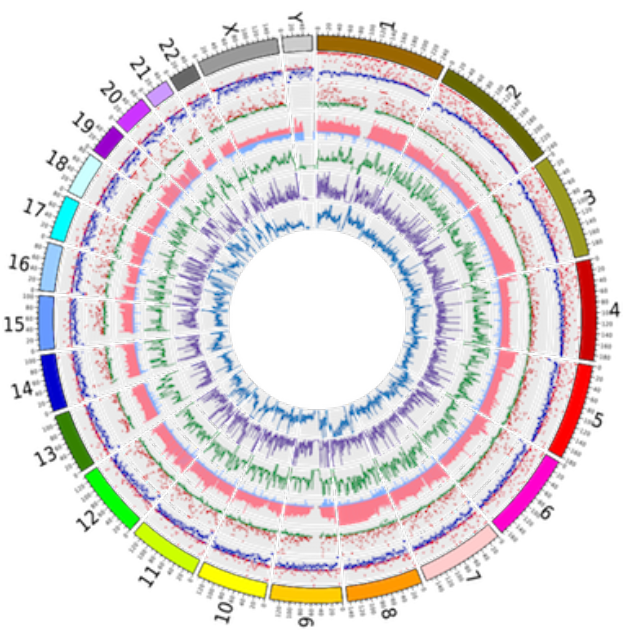
COSMIC Release v84
13 Feb 2018
The February COSMIC release (v84) has arrived! We have been focusing on curation, with 8 new genes, 2 substantial gene updates and a new fusion pair. There have been over 300 new genomes incorporated from 11 systematic screen papers, as have the updates from the ICGC release 26. There has also been an update to the drug resistance data, focused largely on EGFR.
The newly curated genes include ZFHX3 - Zinc Finger Homeobox protein-3, which encodes the transcription factor ATBF1. ZFHX3 acts as a tumour suppressor gene and mutations have been reported in several cancer types - firstly in prostate cancer, and then in breast, colorectal, endometrial, gastric, lung, salivary gland tumours, and neuroblastoma. Mutation types cover the spectrum of changes causing truncation of the encoding protein and intronic changes affecting splice mechanisms.
DGCR8-The miRNA processing gene DiGeorge Syndrome Critical Region 8, and the renal development genes SIX1 and SIX2 -SIX homeobox 1 and SIX homeobox 2 are somatically mutated in the embryonal kidney neoplasia Wilms Tumour (WT). DGCR8 is part of the DROSHA microprocessor complex, which recognises and cleaves a pri-miRNA to release a pre-miRNA. Several DGCR8 mutations have been reported in WT and are often associated with chr22 loss of heterozygosity. The recurrent p.E518K mutation, located at the first dsRNA binding domain, has been shown to cause reduction in critical mature miRNAs in tumours. The highly homologous SIX1 and SIX2 genes are essential for progenitor renewal and early renal development. Loss of SIX2 has been shown to result in epithelial differentiation and loss of nephron progenitors. A recurrent mutation located in the homeodomain, p.Q177R, is found in both SIX1 and SIX2 in WTs and is thought to act dominantly, altering the DNA binding properties and thus upregulating cell cycle genes involved in kidney development. SIX1, SIX2 and DGCR8 mutants can be seen early in tumour development or appear at later stages and show evidence of association with poor outcome and disease progression, often being observed in chemotherapy resistant tumours and/or at recurrence. SIX1/2 mutants observed in combination with DGCR8 or other miRNA processing gene mutations in a single tumour show evidence of RAS activation and a higher rate of relapse and death.
NCOA2 - Nuclear receptor coactivator 2 gene encodes a transcriptional coactivator (SRC-2) that modulates gene expression by hormone receptors. In prostate cancer, NCOA2 is found to be both amplified and mutated. The genomic and functional data suggest that NCOA2 functions as a driver oncogene in primary tumours by increasing AR signalling, which is known to play a critical role in early and late stage prostate cancer. However, NCOA2 has many additional targets, including genes involved in cell-cycle regulation, signal transduction, apoptosis, immunity, and transport, which also may contribute to tumorigenesis. In liver cancer NCOA2 has been proposed to act as a tumour suppressor. Deletion of NCOA2 in mice promotes diethylnitrosamine (DEN)-induced liver tumorigenesis. Low levels of NCOA2 and its target glucose-6-phosphatase (G6pc) in HCC patients are associated with poor survival. NCOA2 may promote liver tumorigenesis in cooperation with Myc. NCOA2 mutations have also been reported in melanoma and lung cancer where they clustered in two highly conserved regions of the gene, and several other cancers.
TP63 - Large scale exome sequencing studies have identified mutations in genes involved in the differentiation programme of squamous epithelium and the Notch/p63 axis, including TP63, as drivers of squamous cell carcinoma of the head and neck. Recurrent missense and nonsense mutations in TP63 have been found.
LZTR1 - Leucine Zipper Like Transcription Regulator 1, encodes a BTB-Kelch protein that localises to the golgi and acts as a tumour suppressor. Somatic mutations in LZTR1 have been observed across a number of different cancer types, including endometrial, skin and colorectal cancers. They are also seen in glioblastoma, where they have been demonstrated to co-occur with copy number loss. Predisposing germline mutations and loss of heterozygosity are frequently seen in schwannomatosis.
ACVR2A - activin A receptor type 2A, encodes a transmembrane serine-threonine kinase receptor that mediates the functions of activins, members of the transforming growth factor-beta superfamily. ACVR2A acts as a tumour suppressor gene with a hotspot at an 8-base pair polyadenine tract in exon 10 where truncating frameshift mutations occur in gastrointestinal cancers with microsatellite instability.
The curation team have made substantial updates to POLE and PIK3CA.
POLE - DNA polymerase epsilon- has been significantly updated over the last few releases. Hotspot mutations, such as p.P286R, in the POLE exonuclease domain are associated with an ultramutated tumour phenotype which often includes elevated levels of other driver gene mutations. The mutational signature can be used to subclassify endometrial and colorectal cancers, guide the treatment and act as a prognostic marker. POLE ultramutated tumours are likely to be sensitive to immune checkpoint inhibitors and there are several ongoing trials investigating these agents alone or in combination with chemotherapy or other biological agents.
PIK3CA - PIK3CA encodes a key component of the PI3K pathway, which plays a key role in many different cancers and is a recognised drug target. Somatic mutations in PIK3CA occur with high frequency, in particular in colorectal, breast and endometrial cancers. In the current release we have updated PIK3CA, focusing on adding novel mutations and papers describing cancers in which it is less well described, for example salivary duct carcinoma, vulval carcinoma and overgrowth syndromes.
Finally the new fusion pair TBL1XR1-TP63. This has been identified as a recurrent fusion in diffuse large B cell lymphoma where it is exclusive to the germinal centre B cell-like subtype. TP63 encodes a member of the p53 family of transcription factors with functional domains including an N-terminal transactivation domain, a central DNA-binding domain and an oligomerization domain. TBL1XR1, transducin beta-like 1 X-linked receptor 1, is a member of the WD40 repeat-containing gene family and encodes a component of both nuclear receptor corepressor and histone deacetylase 3 complexes. In all fusion transcripts the TP63 breakpoint is consistent at exon 4, losing the N-terminal domain and conserving the distal reading frame. TBL1XR1-TP63 has also been found in peripheral T cell lymphoma, where this fusion and ALK rearrangements were mutually exclusive.
We also have new 1-click downloads and a multi-filter feature to make the downloading of COMSIC data easier, full details on the changes are available.
Further updates to the Cancer Gene Census have been made, with new genes added to both tiers. Two additional genes, SIX1 and BAX have been added to tier 1, while a further 18 genes have been added to tier 2. These include SIX2, GPC5, RFWD3, USP44, N4BP2, ARHGEF10L, IGF2BP2, SETD1B, CASP3, CASP9, ARHGEF10, LEPROTL1, SOX21, BAZ1A, MGMT, PTPRD, CPEB3 and RAD17. Please note that RAD17 can only be viewed on GRCh37. All variants are annotated to a GRCh37 gene build and we then remap coordinates to GRCh38. The RAD17 transcript we use does not map to GRCh38, this is a limitation of the current annotation system, which we are currently redeveloping.
A complete list of the genes included in the census is available. Further information about the process of including genes in the census and the level of evidence required to meet the criteria for each of the tiers is also available.
For more technical details, check the release notes.
